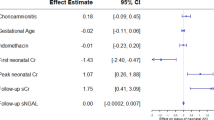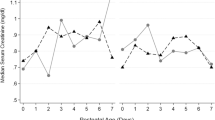Abstract
OBJECTIVE: To determine the risk of persistent renal insufficiency (RI) in premature infants following the use of antenatal indomethacin for suppression of preterm labor.
STUDY DESIGN: This population-based, retrospective review consisted of infants admitted during a 5-year period (1994–1999) to a tertiary referral neonatal intensive care nursery. Data were reviewed on 37 infants whose mothers received indomethacin for tocolysis, and on 37 matched controls. Renal insufficiency was defined as infant creatinine (Cr) ≥1.5 mg/dl (133 μmol/l) for ≥1 day.
RESULTS: Infants whose mothers had received indomethacin for tocolysis were more likely than matched controls to have RI (9 of 37 vs 2 of 37, p=0.04). Among infants of indomethacin-treated mothers with elevated Cr, serum Cr remained ≥1.5 mg/dl (133 μmol/l) for a median of 6 days and >1.0 mg/dl (88 μmol/l) for a median of 19 days. The peak Cr and length of elevation were closely correlated (r2=0.63, p<0.0001).
CONCLUSION: Antenatal indomethacin can result in significant, prolonged RI in the infant. It may pose important risks to renal function and homeostasis in premature infants.
This is a preview of subscription content, access via your institution
Access options
Subscribe to this journal
Receive 12 print issues and online access
$259.00 per year
only $21.58 per issue
Buy this article
- Purchase on Springer Link
- Instant access to full article PDF
Prices may be subject to local taxes which are calculated during checkout

Similar content being viewed by others
References
Zuckerman H, Reiss U, Ribinstein I . Inhibition of human premature labor by indomethacin Obstet Gynecol 1974 44: 787–92
Macones G, Robinson C . Is there justification for using indomethacin in preterm labor? An analysis of neonatal risks and benefits Am J Obstet Gynecol 1988 177: 819–24
Baerts W, Fetter W, Hop W, Wallenburt H, Spritzer R, Sauer P . Cerebral lesions in preterm infants after tocolytic indomethacin Dev Med Child Neurol 1990 32: 910–8
Vanhaesebrouck P, Thiery M, Leroy J et al. Oligohydramnios, renal insufficiency, and ileal perforation in preterm infants after intrauterine exposure to indomethacin J Pediatr 1988 113: 738–43
Norton M, Merrill J, Cooper B et al. Neonatal complications after the administration of indomethacin for preterm labor N Engl J Med 1993 329: 1602–7
Nishikubo T, Takahashi Y, Nagakawa Y et al. Renal impairment in very low birthweight infants following antenatal indomethacin administration Acta Paediatr J 1994 36: 202–6
Eronen M, Pesonen E, Kurki T, Teramo K, Ylikorala O, Hallman N . Increased incidence of bronchopulmonary dysplasia after antenatal administration of indomethacin to prevent preterm labor J Pediatr 1994 124: 782–8
Major C, Lewis D, Harding J, Porto M, Garite T . Tocolysis with indomethacin increases the incidence of necrotising enterocolitis in the low birth weight neonate Am J Obstet Gynecol 1994 170: 102–6
Itskovitz J, Abramovici H, Brandes J . Oligohydramnios, meconium and perinatal death concurrent with indomethacin treatment in human pregnancy J Reprod Med 1980 24: 137–40
Cantor B, Tyler T, Nelson R, Stein G . Oligohydramnios and transient neonatal anuria. A possible association with the maternal use of prostaglandin synthetase inhibitors J Reprod Med 1980 24: 220–3
Veersema D, De Jong P, Van Wijck J . Indomethacin and the fetal renal non functioning syndrome Eur J Obstet Gynecol Reprod Biol 1983 16: 113–21
Heijden A, Provoost A, Nauta W et al. Renal functional impairment in preterm neonates related to intrauterine indomethacin exposure Pediatr Res 1988 24: 644–8
Souter D, Harding J, McCowan L . Antenatal indomethacin-adverse fetal effects confirmed Aust N Z J Obstet Gynaecol 1998 38: 11–6
Gerson A, Abbasi A, Johnson A et al. Safety and efficacy of long-term tocolysis with indomethacin Am J Perinatol 1990 7: 71–4
Miall L, Henderson M, Turner A et al. Plasma creatinine rises dramatically in the first 48 hours of life in preterm infants Pediatrics 1999 104: 1–4
Baenziger O, Waldvogel K, Ghelfi D et al. Can dopamine prevent the renal side effects of indomethacin? A prospective randomized clinical study Klin Padiatr 1999 211: 438–41
Author information
Authors and Affiliations
Rights and permissions
About this article
Cite this article
Butler-O'Hara, M., D'Angio, C. Risk of Persistent Renal Insufficiency in Premature Infants Following the Prenatal Use of Indomethacin for Suppression of Preterm Labor. J Perinatol 22, 541–546 (2002). https://doi.org/10.1038/sj.jp.7210790
Published:
Issue Date:
DOI: https://doi.org/10.1038/sj.jp.7210790
This article is cited by
-
Antenatal Indomethacin Use Altering the Initial Presentation of Type 4A Bartter Syndrome
Indian Journal of Pediatrics (2021)
-
Response to Dr Jeyaraj
Journal of Perinatology (2007)
-
Tubular proteinuria in pre-term and full-term infants
Pediatric Nephrology (2006)



